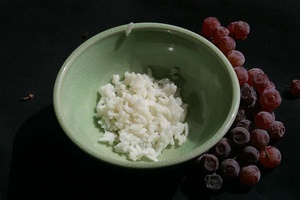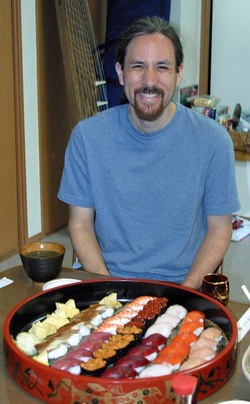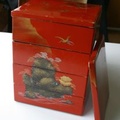My mother was always reminding me to eat every grain of rice from my bowl: “Hito tsubu mo nokosanaide tabenasai.” It’s the equivalent of “Clean your plate.” Japanese mothers are just like Jewish mothers in this regard. Well, the stereotypical ones, at least. They command and plead, “Eat it up, you don’t want to end up like those kids.” The implication here was pale and scrawny. Pale and scrawny white or pale and scrawny black. Didn’t matter. You didn’t want to grow up skinny and looking like a ghost or black like a kuro. We needed to be an in-between pale brown with pink cheeks.
Food equaled health and wealth. Poor children in Africa, we were told, didn’t have the luxury of leaving a grain of rice. So along with the injunction, we must also be grateful, thankful, arigatai, blessed, appreciative, and more. And thus we tried, sometimes harder than at other times. If we couldn’t have that Twinkie for dessert unless our rice bowls were clean we made an extra effort to be grateful and thankful. If it meant no second helpings of stew, the effort might not be as great. Mostly we mumbled under our breaths. What’s “grateful” to a kid? We heard the term repeated in the sermon by the priest on Sunday—“Be grateful for Buddha’s blessings and teachings.” We learned about it from teachers who told us we should be grateful we could go to school. Go to school! Come on!
So there it was, “Be grateful and eat all your rice.”
Then the war broke out and we went to camp for almost four years and daily we heard the injunction about rice: “Gaman. At least we have rice. Some people in the world don’t have even that. Eat every grain.” Not surprisingly I did clean my plate because it was a given that we’d have three meals a day at a specified time with a certain amount of food. Period. Like a prison, which it was, really. If we were hungry between meals our snacks were usually soda crackers bought at the canteen and jelly and peanut butter. My mother told me that the peanut butter provided protein so I should not hesitate to put liberal chunks on my crackers. She made sure there was a jar sitting on the window sill.
Gratitude. Yes, I was grateful for that jar filled with stick-to-the-roof-of-your-mouth peanut butter. Gratitude behind barbed wire. It had a real visceral meaning now. It took a few hunger pangs to understand. Not hunger pangs of the “I want to eat now” variety, but the “Maybe the pangs won’t be satisfied” variety with an edge of uncertainty about the next meal. Gratitude. Gratitude because you will have that next meal.
Besides the Last Grain of Rice Rule I also heard the Chew Your Food Rule repeated over and over. “Chew your food thirty nine times before you swallow.” Sometimes I wondered if my mother actually watched me and counted the number of times my jaw moved up and down. “See, you didn’t chew long enough,” she’d admonish. “Your stomach won’t have to work so hard.”
On my last visit to Japan in 2009 I met with my cousin Sachiko. Sitting in front of a magnificent spread of sushi we reminisced about her father and my mother. The topic on hand was food. Imagine my astonishment when Sachiko said, “My father used to command me to chew my food thirty nine times before I swallowed.” After a second’s pause I replied, “My mother told me the same thing!” We both looked at each other and burst out laughing and couldn’t stop.
When we had finally subsided into giggles, we shared more food stories. Yes, her father made all six children clean their plates of the last grain of rice. Yes, he didn’t allow snacks between meals except for some fruit and on rare occasions, a Japanese sweet or senbe. “That’s why I love to eat so much,” she told me, “because when I was growing up I was so restricted. We didn’t have enough food during the war, but later, we did, but I still had only a rationed amount on my plate.” So we talked more about the scarcities during the war. I found out that for a number of years after we had moved to Salt Lake City from Amache my mother had sent “care packages” to her brothers’ families: coffee, oil, sugar, dried beans, and always some bars of Baby Ruth and Hershey’s Kisses.
Sachiko confided, “Sometimes they were all melted into a lump, but we didn’t care. Chocolate was so good. We were so happy, so grateful.” That word again. “Thank you,” she said, “thank you. I’m so happy I can say this to you at last in person.”
“Did your father make you wait until he sat at the table before you began?” I asked. Again, we knew the answer and burst out laughing. Another rule: “Wait until Daddy sits down. The head of the house must start first.”
“How about ‘Sit up straight’?” Yes, that, too. “Did you have to put your chopsticks straight in a line on your bowl after you finished?” Sachiko nodded.
“We might have been brought up in the same household,” I told Sachiko. We both found it quite amazing that these rituals continued on two different continents in two quite diverse cultures. Those early childhood lessons were apparently never forgotten by my mother and her two brothers.
There were also the admonitions to eat majimeni. No dumb jokes, no giggling (smiling was OK). Seriously. Eating was serious business. If we wanted to grow big and healthy, we must take our food seriously. It was nourishment for our minds and bodies and it was our bodies that we lived within and it must carry us through the remainder of our lives. Eat with attention and mind those grains of rice.
All this focus on mindfulness was ripped apart when we were sent to camp. From the first day at the Orange Mess Hall at Santa Anita there was no such thing as being majimeni. The crowds were mostly orderly but it felt as if a heavy lid had been dropped on the crowd and the people were squirming and pushing and murmuring to find a release, to locate the safety valve. There was no more chanto—properly—anything. No sitting properly, no eating properly. My mother ceased her preaching. Not a huge surprise to me, but I missed it. I needed that focus. I wished that she would recite these rules to me, but she couldn’t. Under the circumstances, she couldn’t.
For the first week our family of four ate together, bunched up on a long picnic style table, but soon my father wandered away, seeking solace alone or eating with a new friend. My brother, too, found boys his own age to share his meals. So we no longer waited for my father, we no longer tried to chew our food slowly. Rather, it was “bolt it down fast and get out of this place.”
But, it seems, no matter the circumstances, when we finished our meals we remembered our last ritual: gochisousama. Thank you for the feast. With gratitude for that last grain of rice, gochisousama.
© 2012 Lily Havey








